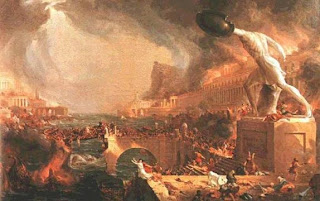
From Juvenal's tenth satire, variously referred to as "The Vanity of Human Wishes", "The Futility of Aspirations" or "Wrong Desire is the Source of Suffering":
...iam pridem, ex quo suffragia nulli uendimus, effudit curas; nam qui dabat olim imperium, fasces, legiones, omnia, nunc se continet atque duas tantum res anxius optat, panem et circenses...Translation: "Now that no one buys our votes, the public has long since cast off its cares; the people that once bestowed commands, consulships, legions and all else, now meddles no more and longs eagerly for just two things----Bread and Circuses!"
Bread and circuses...food and entertainment. The Roman republic decayed over time and eventually succumbed to the tyranny of empire. Juvenal was born in the middle of the first century and wrote into the early second century. Thus, Juvenal lived not long after the end of the Republic, in the early Imperial period.

In his tenth satire, Juvenal notes that the masses, the poor, care only for their Bread and Circuses. He notes that in the past these people, the former plebeians, had conferred power by election. Now no one needed their vote. Emperor Tiberius extinguished the plebeian assemblies in the first century, abolishing the last vestiges of popular representation. Thus, the Roman people had given up the birthright of political freedom that they had earned by replacing the early kings of Rome with elected officials.

Has the United States, our own republic, become decadent over time? Have we, the American people, fallen victim to a "bread and circus" mentality in our primary concerns are simply food and entertainment? I think you could certainly make a compelling case that we are traveling a similar path.
Citizens do seem to increasingly look to the government as a direct provider of basic benefits. Aren't we seeing right now a very populist mentality towards wanting the government to take action to ensure "jobs" exist for us? As for entertainment, the American culture increasingly seeks "spectacle" whether it be "reality TV", violent movies, or erotica.
The United States of today is not Rome at the end of its republican period. But, it is scary to see parallels. For example, there is a pervasive political apathy in American. Yes, I agree there was a certain level of excitement about Barack Obama. But how much of that was the "spectacle" of the first person of color being elected President? Has there really been a wellspring of new political participation? Let us hope.

It has been famously said that "all politics are local". And yet, how many of us vote in local elections? Political corruption is as old as politics itself, but it is still our duty as citizens to watch our elected officials. And yet, how many of us shrug indifferently at political corruption? Or, worse, view it as simply more "entertainment"?
It is our right as citizens to elect our own government. Representative democracy is the best form of government, but it only works as long as there is participation by the people. Our right to vote isn't being threatened, at least not yet. But are we simply tossing this most precious gift into the trash heap by sheer indifference toward participating in the political process?
In October 1974, a British MP named Sir Keith Joseph gave a speech at the Grand Hotel in Birmingham, England. The speech was not focused on "bread and circuses" it was about Conservative Party leadership in difficult times. However, Sir Joseph did make this remark:
The populist rulers of Rome thought they had hit on a foolproof method of achieving a permanent curb on their patrician rivals when they created a dependent proletariat relying on them for bread and circuses; but in the end it destroyed the political stability of Rome, and so Rome itself fell, destroyed from inside.More recently, in August 2007, our own former comptroller general of the GAO, David M. Walker, made these remarks as part of a presentation entitled "Transforming Government to Meet the Demans of the 21st Century":
America is a great nation, probably the greatest in history. But if we want to keep America great, we have to recognize reality and make needed changes. As I mentioned earlier, there are striking similarities between America’s current situation and that of another great power from the past: Rome. The Roman Empire lasted 1,000 years, but only about half that time as a republic. The Roman Republic fell for many reasons, but three reasons are worth remembering: declining moral values and political civility at home, an overconfident and overextended military in foreign lands, and fiscal irresponsibility by the central government. Sound familiar? In my view, it’s time to learn from history and take steps to ensure the American Republic is the first to stand the test of time.Recall our discussion of Janus from yesterday. Seek to learn the lessons of the past so that the same errors are not committed in our time.
Peace be with you.

No comments:
Post a Comment